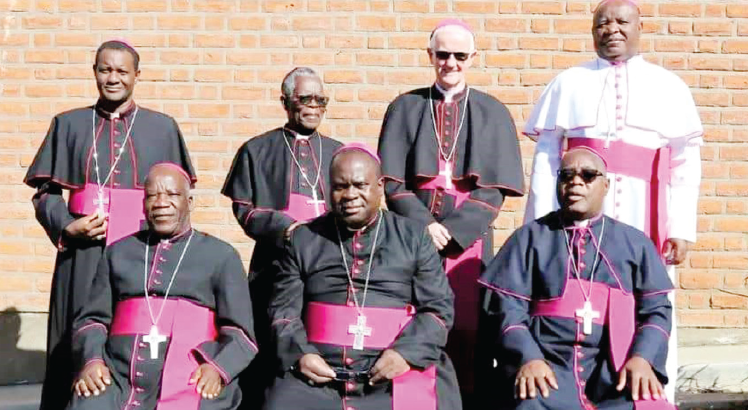Malawians let down—bishops
The Episcopal Conference of Malawi (ECM) says lack of visionary leadership, corruption and a failed judicial system have stalled development and let down Malawians now grappling with a myriad of socio-economic challenges.
In their pastoral letter titled ‘The sad story of Malawi’ read out in Catholic churches nationwide yesterday on the second Sunday of Lent, bishops of the eight dioceses alongside two auxiliary bishops noted that instead of arriving in the ‘Promised Land’ of Canaan, the current administration has taken Malawians to Bagamoyo, a town on the east coast of Tanzania where a slave lost all hope of being free again.
Reads the letter: “Instead of reaching the promised land of prosperity we are bogged down in the same land we wanted to leave, namely the land of hunger, disease, poverty, corruption and the like.
“Hence, most Malawians, except the very few well connected ones, feel strongly that there is nothing else they can do to turn around the country or improve the deteriorating living conditions..”

The letter also said the clerics’ engagements with President Lazarus Chakwera have yielded nothing while poor governance has worsened the situation than it was in June 2020 when Chakwera and the Tonse Alliance triumphed in the court-sanctioned fresh presidential election.
On corruption, the bishops observe that from the top down, people with connections are unjustly turning into multimillionaires overnight through bogus deals at the expense of the majority who are being kept in grinding poverty.
Reads part of the letter: “Every effort has been made to systematically hollow out and weaken oversight institutions, almost all of which have now been rendered useless.
“The fight against corruption has been allowed to collapse. Shame on those who have allowed this to happen!”
The bishops have not spared the Judiciary which they have challenged to be non-partisan and clear perceptions that it has abandoned its integrity and has embroiled itself in corruption and partisanship.
Write the bishops: “The price of judges and magistrates is no longer taboo; it’s an open secret that some lawyers thrive by bribing judges and magistrates to defeat the ends of justice. Some judges and magistrates are accountable to no one.
“They take years to hear a case, yet the Judiciary does nothing to discipline them. Instead, they are rewarded with promotion. We believe that the Ministry of Justice is frustrating efforts by the Malawi Law Society to put in place a law that regulates the judges.”
Reacting to the letter in an interview yesterday, Malawi Law Society president president Patrick Mpaka said he agreed with the sentiments expressed by the bishops and called for a deep reflection within the legal fraternity.
“It’s a voice and an additional clarion call for reform and fight against corruption worth paying close attention to and deep reflection by those currently exercising any State powers across the three branches of Malawi government,” he said.
The bishops said they are also concerned with religious intolerance and violence, destruction of the environment, attacks against the elderly on the pretext of witchcraft, poor roads, high school fees, starvation, and nepotism.
They also said in their assessment, the Affordable Inputs Programme has become a joke and decried the secrecy on the Public Service Reforms report, dubious deals hinging on corruption, saying the Tonse Alliance seem not to care at all about promises it made.
With general elections set for September 2025, the bishops said much as leaders are responsible for the many problems the country faces, voters were also responsible for choosing leaders who are not able to govern the country properly.
They have since called on voters to get to the polls next year and vote for people who have a better governance record, but also avoid violence and destructive behaviour.
They said: “It is essential to ask of candidates, what their record of service has been, what they are capable of doing, before voting for them, not who they are or where they come from or what connections they have.
“We cannot continue this way as a nation. Our leaders need to stop being greedy and serve the people that put them in power. We need truly empowered oversight institutions that are independent and free from political influence.”
Minister of Information and Digitisation Moses Kunkuyu said the government has “received [the pastoral letter] with appreciation, wisdom and humility”.
The official government spokesperson said: “We acknowledge some cited challenges and remain determined to use the bishops’ wisdom to continue building on the progress the country is making. We also trust that we will continue praying for each other and our beloved country, Malawi.
“As a government, we will not engage in item by item response with the clergy in public. Instead, we will not get tired utilising the engagements that we do have with the clergy from time to time.”
On March 6 1992, ECM released the infamous second pastoral letter, Living Our Faith which preceeded a sweeping wind of political change, marked by the massive transition from one party era to multi-party democracy.
By design, a pastoral letter gives an honest critical analysis of the socioeconomic and political situation of the country. n
Read the full pastoral letter in a special pull-out in this edition





